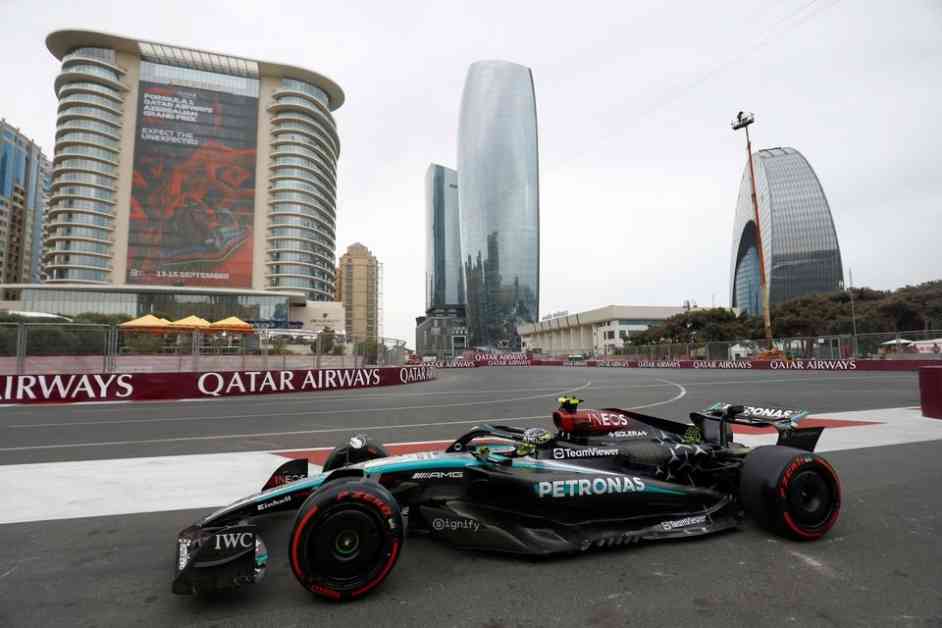Formula 1 teams faced a unique challenge at the Azerbaijan Grand Prix as they had to adapt to new radar systems due to a political dispute between the Azeri and French governments. The usual weather radar system provided by Meteo-France, the country’s official meteorological administration, was not in place at the Baku event. This was because French nationals, including dual citizens, were advised not to travel to Azerbaijan, leading representatives from Meteo-France to stay back.
Without the Meteo-France radar system, F1 had to operate without the usual equipment deployed at the highest point of the circuit to track weather systems. However, the FIA stepped in to provide additional devices to measure wind speed and ambient temperature at various points on the track. While there was only one weather station in the pitlane instead of the usual four, the teams were able to deploy their own versions of weather measuring devices to monitor conditions.
Despite the absence of Meteo-France representatives at the event, they continued to support the race remotely and provide regular forecasts through public information systems. The FIA expressed satisfaction with the level of service provided by Meteo-France during the weekend. The teams adapted to the situation with minimal disruption, relying on commercially available alternatives for weather monitoring.
The political dispute between Azerbaijan and France was fueled by tensions surrounding various interests in the Armenia-Azerbaijan conflict and the arrest of a French citizen on espionage charges. As a result, some French citizens from F1 teams chose not to attend the event. However, the Alpine squad proceeded with its planned staff group for the race weekend.
The start of FP3 on Saturday saw limited running due to a light rain shower in the paddock. Despite the weather challenges, the teams managed to navigate the conditions efficiently. The FIA ensured that the race continued smoothly with the support of Meteo-France staff working remotely.
Subheadings:
1. Impact of Political Dispute on F1 Teams
2. Adaptation to New Radar Systems
3. Resilience of Teams in Navigating Weather Challenges
F1 teams faced an unprecedented situation at the Azerbaijan Grand Prix as they had to operate without their usual weather radar system due to a political dispute between the Azeri and French governments. The absence of Meteo-France representatives at the event meant that F1 had to rely on alternative methods for monitoring weather conditions. Despite the challenges, the teams demonstrated resilience and adapted to the new radar systems effectively.
Impact of Political Dispute on F1 Teams
The political dispute between Azerbaijan and France had significant implications for F1 teams participating in the Baku event. With French nationals advised not to travel to Azerbaijan, Meteo-France representatives responsible for implementing F1’s official weather radar system were unable to attend. This created a unique situation for the teams as they had to navigate the race weekend without the usual equipment in place.
The dispute stemmed from tensions surrounding various interests in the Armenia-Azerbaijan conflict and the arrest of a French citizen on espionage charges. As a result, some French citizens from F1 teams opted not to attend the event, highlighting the impact of the political situation on the racing community. However, the Alpine squad chose to proceed with its planned staff group for the race weekend, showing a commitment to participating in the event despite the challenges.
Adaptation to New Radar Systems
In the absence of the Meteo-France radar system, F1 teams had to adapt to new methods for monitoring weather conditions at the Azerbaijan Grand Prix. While the usual weather radar system deployed at the highest point of the circuit was not available, the FIA provided additional devices to measure wind speed and ambient temperature at various points on the track. Although there was only one weather station in the pitlane instead of the usual four, the teams were able to deploy their own weather measuring devices to track conditions effectively.
Despite the absence of Meteo-France representatives at the event, they continued to support the race remotely and provide regular forecasts through public information systems. This ensured that the FIA had the necessary information to make informed decisions regarding the race. The teams demonstrated flexibility and adaptability in managing the new radar systems, showcasing their ability to overcome challenges in a dynamic racing environment.
Resilience of Teams in Navigating Weather Challenges
The start of FP3 on Saturday saw limited running due to a light rain shower in the paddock, highlighting the weather challenges faced by the teams. Despite the adverse conditions, the teams managed to navigate the situation efficiently and continue with their preparations for the race. The absence of the usual weather radar system presented a unique test for the teams, but they demonstrated resilience and adaptability in overcoming the challenges.
Overall, the F1 teams at the Azerbaijan Grand Prix showcased their ability to adapt to new radar systems in the face of a political dispute between the Azeri and French governments. Despite the absence of the Meteo-France radar system, the teams managed to monitor weather conditions effectively and ensure the smooth running of the event. The resilience and flexibility displayed by the teams underscored their professionalism and commitment to overcoming obstacles in the pursuit of racing excellence.
